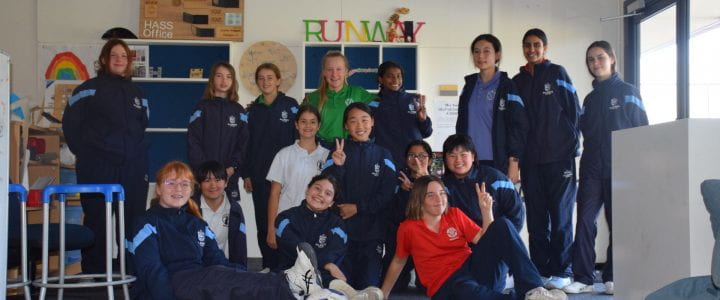The Sustainable development Goal (SDG) that my group and I worked on was goal 5, gender equality. Gender equality is an SDG that’s purpose is to empower women in all they do, as a group comprised of all female-born members, this goal resonated with all of us. Given that this goal covers all the approximately 3.5 billion women in the world, we choose to focus on a more local context, such as decided to work on the younger generation of females at ASC (aka Year 7’s). After doing some extensive research, we have found out that only 30% of research at major tech companies are female, which is an extremely concerning skew considering the progress we have made as a modern-day society.
Within ASC we noticed a trend in how many female students were applying for STEM ATAR in their later high school year. We traced this back and found that this started way earlier on than originally perceived. We decided to work with the year 7 females at ASC, to hopefully make a change in the way that they perceive STEM ATAR, and STEM-based jobs.
This relates to our chosen SDG because we hope to empower women to be able to pursue jobs other than the stereotype ‘female’ jobs (cooking, cleaning, motherhood, etc.)
To come up with a project/solution to our found problem, we followed the design thinking process, and our first step was to decide on a clear aim or goal for us to work towards. Our aim to have completed by the end of our project was to make a positive change to their opinion on STEM ATAR and jobs. The next step was to seek out data to see where we could make improvements in their opinions. So, we delivered and got them to complete a survey to see what they thought, and the next step was to plan out a workshop based on their reply. After conducting the workshop, we sent out a post-workshop survey to measure if we were successful in at least providing them with information to make an informed decision about their future.
While we were planning the workshop, we had many ideas on what we should do, such as doing some sort of collaboration with professionals from Curtin University. However, we decided against this idea, due to time constraints, and instead, we decided to run the workshop ourselves.
A significant piece of planning was our communication with two experts Dr. Rachel Sheffield, who is a Chair of Curtin Academy, and Rekha Koul who is an associate teacher. Both wonderful ladies work directly in females in STEM schooling. We sent numerous messages to and forth and even having an internet meeting to design the workshop which would be an effective solution but additionally a great encounter for the students.
When planning our workshop, we had to consider numerous things including, date, time, and content. One of the major things to consider was, who was to attend? In the end, we decide on inviting the Year 7 female students of ASC. These students were chosen by their tutors based on who they thought would benefit most from the workshop.
Our project succeeded, as we can see from our post-workshop survey in which, 2/3 of the students that attended have said that the workshop has either changed their views or provide more information on STEM and its related jobs which allowed them to make a more informed decision on what they want to do when they get out of school and most students said they were more likely to go into an education-based job instead of a creativity-based job, unlike what they had said previously.
Overall, my group and I have said that the past semester was a beneficial experience for all of us and it has allowed each one of us many important skills. Personally, I would say that this project has been really eye-opening in terms of gender skews and gender equality and the lack of information around matters and topics like these. I feel as I have gained not only knowledge in subjects I didn’t have before but also gained a sense of pride that my group and I were actually able to help change some young girl’s views and add to their knowledge to make informed decisions about their education.
In the future, if we have the opportunity, we hope that we could possibly hold a series of these workshops and if we do decide to continue this elective in the future we do hope to build on this project. This would allow us to make a more significant and long-term impact on the younger students at ASC. Furthermore, if we were to do this, we would be better equipped with more experience and prior knowledge. I myself am planning to work with the staff and see if I can regularly hold these workshops to encourage the younger and upcoming generations.
Finally, I would like to give a big thanks to professors Rachel and Rekha who had offered their knowledge and time, which has assisted us throughout this semester. I would also like to extend my thanks to Ms. Catherine Donnelly, our classroom teacher who has guided us throughout this project and of course, our parents who have done nothing but been a huge support throughout this entire project.
